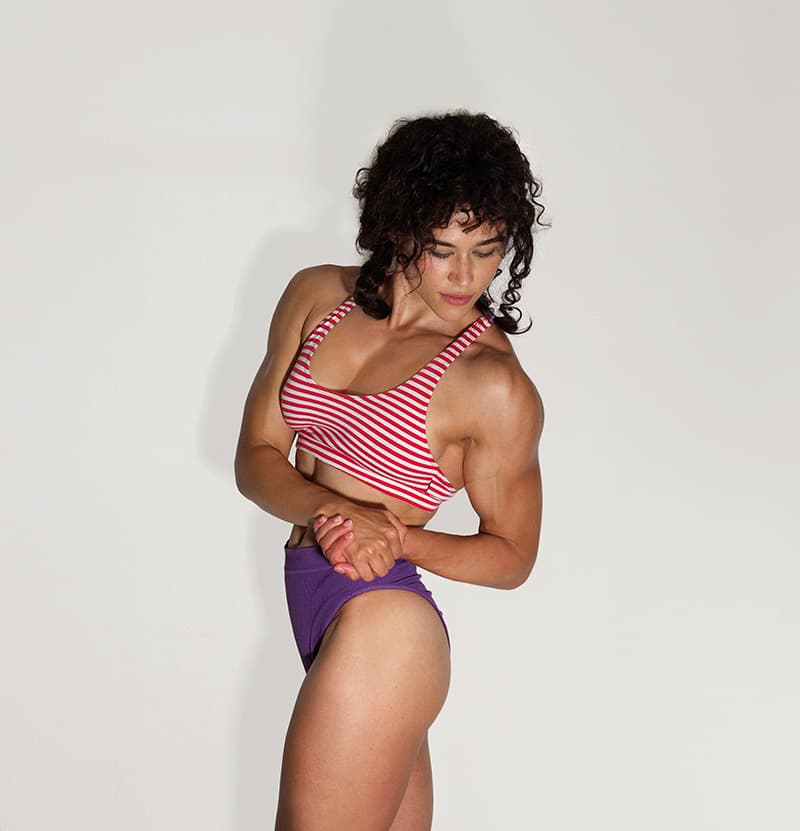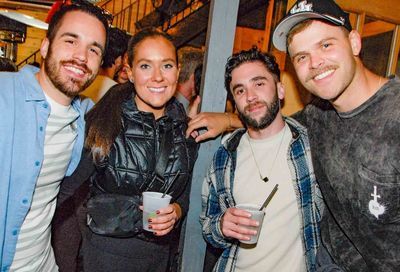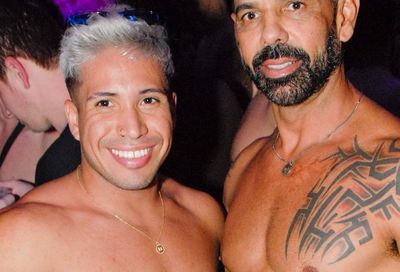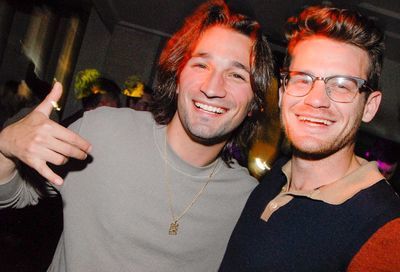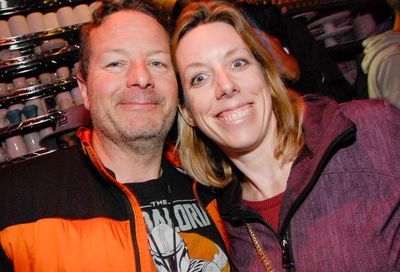Making the Point
Funding the future of gay and lesbian scholars with the Point Foundation
Washington is a college town. It may not be the first thing people think of, but with American University, Catholic University, Gallaudet University, George Washington University, Georgetown University, the University of the District of Columbia, other local colleges and more D.C. campuses of out-of-state schools than you can shake a mortarboard at, the district is bursting with higher education. And it’s big business.
According to College Board, a non-profit organization that surveys schools annually, the average cost for tuition and fees at a four-year public college for the 2004-’05 school year was $5,132. For the same period at a private school — easily the majority of D.C. institutions — the price tag was $20,082.
We can look to other statistics to figure that somewhere between 2 to 10 percent of the students incurring these bills are gay or lesbian. That may be seen as a pointless statistic. On the other hand, as GLBT Americans come out at ever younger ages, they put themselves at ever greater risk of alienating their families, peers, school administrators — all those who may have a role in funding a young person’s education, or helping them achieve well in high school in order to make it into a good college in the first place.
One organization has been steadily growing for nearly five years with just these students in mind. The Point Foundation, based in Chicago, is the country’s only nationwide scholarship organization focused on GLBT students.
”I’m from a different generation — most of us came out late in our lives,” says Vance Lancaster, the foundation’s executive director. ”I didn’t come out till I was done with my schooling. Today, the average coming out age is 16. You’re still living at home and you depend on your family. If your family doesn’t support you, you lose financial support. If you’re living on the streets or in your car, it’s hard to think about college or what you want to do with your future. Some of our kids have had to change schools. Some have been rejected for traditional scholarships for writing openly in their applications about being gay or lesbian…. It’s good that kids are coming out younger. It’s healthy that young people are coming out earlier, but it can complicate their lives.”
This is where the Point Foundation steps in, doing what it can to ensure that exceptional GLBT students are not denied the fruits of higher education because they lack support. A Point-run mentoring program also seeks to provide guidance that may be as much in short supply as dollars.
”We’re not just giving them a check and saying ‘good luck,”’ says Lancaster. ”We’re also pairing them with mentors who will continue to be involved with the scholars past graduation, doing things parents might do.” Those scholarship checks, however, can provide plenty of comfort to students, helping them all the way through to graduation. Lancaster says that when he joined the Point Foundation three years ago, the foundation had an annual budget of about $150,000. Today, as executive director, and a substantial donor himself, Lancaster helped raise roughly $2.6 million during the past year. While that’s healthy growth, college costs have a way of diluting that success.
”This year, we had almost 2,200 applications,” Lancaster points out. ”We were only able to give 20 scholarships. That’s a demonstration of the tremendous need. I believe those 2,200 kids are just the tip of the iceberg. We’re not even able to scratch the surface.
”The thing that made me want to join the foundation was meeting a few of the scholars. These are young people doing extraordinary things. Most of them have been marginalized. Despite that, they are achieving academically at the top of their classes, and really making a difference in the gay and lesbian community. I feel really proud to be at the table with these young people.”
Meet the Scholars
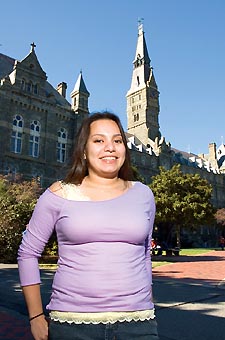 Monica Escobar |
The Point Foundation has helped dozens of GLBT scholars across the country, and Washington, D.C., is no exception. There is Jessie Gilliam, a 2004 Point scholar currently in the George Washington University graduate program, concentrating on public affairs and women’s studies. At American University, 2003 scholar Michelle Marzullo is working on her anthropology doctorate. With the start of the 2005-’06 school year, Gilliam and Marzullo have got some scholarly company. Of the Point Foundation’s crop of 20 new scholars for 2005, three attend school in D.C. Monica Escobar is a junior at Georgetown University. Lyndsey Vierra plans to complete her undergraduate work at American University by December 2006. And Michelle Carnes is nearing her Ph.D. on the same campus.
As a 29-year-old working on her doctoral dissertation, Carnes may not fit the traditional idea of a starving, young student. Actually, she says she didn’t think the Point Foundation would even consider helping post-graduate students.
”I had no idea they actually supported graduate students,” says Carnes, who nonetheless thought the Point Foundation scholarships were much needed in the academic arena. As a doctoral student teaching undergrads in classes such as ”Lesbian and Gay Cultures,” she touted the Point Foundation and encouraged her own GLBT students to apply for the scholarships. It was Marzullo who convinced Carnes to apply for the scholarship.
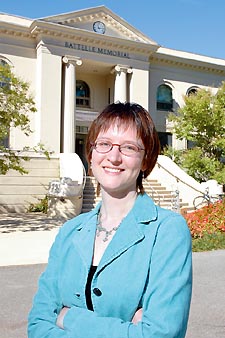 Michelle Carnes |
”She encouraged me to apply,” Carnes recalls. ”I didn’t think I’d get that scholarship. I really didn’t. I was used to paying for everything myself. I’d been a dancer, I’d done all kinds of jobs. I just thought that was how it would be for me. I was totally floored. I didn’t think I had any shot.”
It was one of the few breaks Carnes has gotten, having put herself through her previous schooling, first at Purdue University in Indiana. Carnes’s work history includes exotic dancing for other lesbians. She’s applying that to her dissertation.
”My dissertation is about African-American, lesbian, strip-performance places, like Level, Wet,” Carnes says with gusto. ”There are all kinds of issues about keeping things ‘on the down low,’ keeping things quiet…. I was a dancer when I was a senior at Purdue. I’d never seen women dancing for women. I was so thrilled…. To make this my field of study is fantastic to me. For me, personally, I think it’s been a revelation that I can study this, that it can be treated seriously. I never thought I could come out of the stripper closet.
”It’s an ethnography. I’m doing a participation-observation thing. I’ve been asked to dance a couple times. I’m considering it. I write a lot of field notes, interviewing, recordings…. The fact is, this kind of writing isn’t always accessible to people, so I’m also making a film. I think it will get a lot more mileage. It will be more accessible than a dissertation…. If Reel Affirmations would show my film, I would be thrilled.”
At the heart of it, Carnes’s academic path is not as exotic as it might seem. A conventional mother who withheld all financial support for schooling, forbade Carnes from wearing political T-shirts on holiday visits home from Purdue, and insisted on convention over all, apparently left Carnes with a disdain for ”keeping up appearances.” Also at Purdue, she had the pleasure of studying under Evelyn Blackwood.
”She’s like my hero,” admits Carnes. ”She’s actually quite famous. She’s an out lesbian, an anthropologist at Purdue…. I didn’t know there were ‘queer studies’ till my junior year there. When I found out there was a whole field, I was overjoyed.”
Rebelling against her mother’s convention, and following Blackwood’s lead into queer studies, Carnes says she hopes the ”Dr.” salutation is just months away. ”At this point, I’m done with all coursework for my Ph.D. I have tuition through school, and the Point Foundation provides the money to pay my expenses while I’m here,” says the Midwest native. ”Washington is a really expensive place to live, especially if you’re from Indiana. [The Point Foundation] gave me $10,000, living expenses for the academic year. It’s tremendous. It makes such a difference to me. I can focus entirely on my dissertation. This is really to get me to the finish line.”
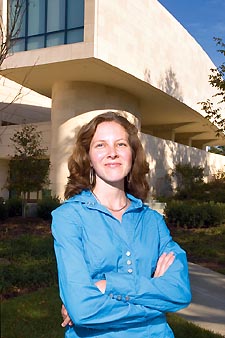 Lyndsey Vierra |
Vierra, like Carnes, is also a student at American University. They are also recipients of the same Point Foundation scholarship, the Carlos Enrique Cisneros Point Scholarship, created by family and friends of the gay A.U. graduate, Point Foundation trustee, philanthropist and business leader who died of a drug overdose in April 2004.
Another similarity the 26-year-old Vierra shares with Carnes is a work ethic, having dedicated much of her energy to GLBT and other social causes. ”When I came out, at 15, I started going to support groups at [the Sexual Minority Youth Assistance League],” says the former Northern Virginian. ”I got involved with their Youth Council. We did a lot. We looked at harassment that was going on in public schools. At that time, there weren’t any GSAs (Gay-Straight Alliances)…. I went to college for a year after high school, at the University of Hartford [in Connecticut]. I was president of the campus GLBT group. I came back to D.C. and got an internship with the National Gay and Lesbian Task Force, focusing on GLBT youth issues.
”I took a lot of time off [from school] to work,” continues Vierra, who shows no signs of slowing down. ”I’ve been doing work in the non-profit community in D.C. After my job at the Task Force, I worked for Families Against Mandatory Minimums [challenging drug-sentencing laws]. I worked there for a couple years. Then I got my current job at D.C. Scores. It’s an after-school program that uses creative writing and soccer. I’ve been there for three years. I’m a program coordinator.” Vierra has also worked to create a local, quarterly magazine dedicated to social-justice issues, Divided City.
Unlike many Point scholars, Vierra says coming out didn’t hurt her academic career. Her commitment to community activism, however, clearly makes her a sound investment for Point’s dollars.
”My major is American studies,” she says. ”I’ve focused on the history of social movements to build a foundation for all of my activism…. The Point Foundation gave me $5,000 for this year. It’s gone toward my tuition. Since I work full-time, it supports me, too. Next year, they’ll reevaluate me, but it’s guaranteed that they’ll continue to support me.”
Escobar, a short distance from Carnes and Vierra, over at Georgetown University, also knows how to harness her energy, not that it’s always the best plan of action.
”It was my sophomore year of high school when I first had the biggest crush on my volleyball coach. I liked a lot of girls,” Escobar says, remembering her conservative Catholic high school in Northern Virginia. ”That continued all through high school. But with school, sports, homework, it was easy to ignore. I could dive into academics and athletics. I didn’t seriously give it much thought till I got to college.”
Although Escobar, 20, turned her seemingly laser-like focus and unyielding drive toward academics and sports, her sexual orientation refused to be ignored. At Georgetown, with its own conservative Catholic history, Escobar surrendered.
”I tried to avoid anything related to queer life [at Georgetown]. I tried to stay away from it,” explains Escobar, who today is co-president of the university’s gay student group. ”Finally, I got involved. It was daunting at first, giving credence to this thing I suspected. I’d been struggling with it for three years. But I knew what it was.”
As Escobar’s sexual orientation began to work against her — diminishing her chances at winning scholarships aimed at Latina students, and putting an end to the small amount of funding her parents could afford — timing was on her side. Georgetown gay alumni were already working with the Point Foundation to create a new scholarship. Escobar is the first recipient of this Georgetown gay alumni scholarship, which is the only such alumni-specific scholarship offered by Point, as yet.
”[The scholarship] is essentially for students who have been disowned, emotionally or financially. I fall under both of those,” says Escobar. ”My parents are not supporting me financially at all…. I didn’t even go home this past summer.
”My scholarship is $7,500. It covers a little bit of tuition, room and board, general fees here and there.”
Aside from the help she’s getting from Point and the alums, coming-out has also allowed Escobar to flourish academically.
”Being in the closet and struggling was hard. I wasn’t happy. I was always thinking about it. It was difficult to totally concentrate. I had a good year when I started to admit it to myself. My sophomore year [at Georgetown] was one of my most productive,” she says, now a junior majoring in English and linguistics. ”Coming out has been a catalyst to succeed.”
Successful or not, Escobar says she didn’t think she would qualify for a Point scholarship. She says she had the impression she needed a larger cross to bear.
”I heard about [Point Foundation scholarships] my freshman year, but I didn’t apply because I didn’t think I was good enough,” she explains. ”[Other Point scholars’] stories seemed so much more poignant. My parents never sent me to an [ex-gay] camp. I didn’t have to live on the streets.”
Kevin Ciotta, a coordinator of the unofficial Georgetown University alumni group, says many of his group’s nearly 200 members had been looking for ways to support the university, but had reservations about the Catholic university’s seeming reluctance to embrace the gay community. Homeless or not, Escobar fit the bill.
”[The scholarship] lets alums, who may not have had the desire to give to the institution in the past, give to the students,” says Ciotta, who attended Georgetown from 1983 to 1987. ”There are people I know who have not contributed to Georgetown because of these issues…. Our members have had varied experiences as undergrads at Georgetown. My experience at Georgetown was not a negative one. It was also not an open, supportive environment. I didn’t feel that there were a lot of services or support offered. But people are motivated to really make a difference now. The graduates want to see a much more open, diverse environment. We’ve seen things change for the better, but there is always room for improvement.”
Escobar calls administrative efforts to make Georgetown more gay-friendly ”half-hearted.” She says, however, that administrators are quick to respond to alumni concerns. In that sense, Ciotta and his fellow gay alumni are working to make Georgetown a more gay-friendly campus. Vance Lancaster agrees that the student-alumni formula for scholarships is a promising one, adding that the Point Foundation hopes to duplicate it around the country.
Nurturing New Growth
In the coming months, the 2005 scholars will forge relationships with Point Foundation mentors. Carnes has already begun corresponding with hers, Ron Sepielli, a Point trustee. ”He’s been really helpful, taking this toolbox of skills that I have and shaping me,” Carnes says. ”Where would I have the biggest impact? I have all these degrees, which is wonderful, but where do I fit in? I want to put it all together to good use. He’s been asking me lot of questions through e-mail. We’re working on the best strategies for me.”
Looking to the future, Point scholars have already begun networking among each other, creating exciting possibilities for a future GLBT ”brain trust.” Point fosters this interaction, bringing scholars to San Francisco during the final stages of the application process, as well as to an annual retreat.
”It’s a wonderful idea, showing youth that the GLBT community wants to make an investment not only in their education, but also in their personal and professional development,” says Vierra. ”The scholars that I’ve met, we’re a community. We’re all doing different and interesting things around the country. We’re a network.”
Adds Escobar: ”I’ve never met such an awesome group of students. It’s so inspiring and uplifting to meet with students and adults doing the same work. There are very few [gay] activists on campuses, and that feels disheartening. Knowing I’m not alone is the best thing about the foundation. The money is important, but the emotional support is probably more valuable.”
Each student says she would gladly contribute to the Point Foundation as a mentor. Building upon gay Georgetown alumni support, Ciotta says that members of his group would also like to sign on to Point’s mentorship program in the future. As it stands, his group’s involvement is currently limited to funding their scholarship, while Point in responsible for administering it.
”We’ve talked with Point about having one of the alums be involved in the mentoring,” says Ciotta. ”I think there’s room for more than one mentor. A lot of people are interested. We have alums all around the country and around the world who would be interested in working with undergrads…. We’ve committed to funding [the scholarship] for four years. We want to continue, and hopefully grow it. We did a kind of limited round of fundraising with key alums. Next year we hope to broaden that pool significantly. We’re excited about it. I think it’s the first formal activity we’ve done as an alumni group.”
Planting the seeds of scholarship is a burgeoning undertaking, says Lancaster, pointing to Point Foundation’s nearly 50 scholars, but need far outweighs resources.
”With more scholars, we have a greater need for mentors,” he says. ”Our number one need is fundraising, but mentoring is a need. We also need volunteers to help us get the word out, to act as ambassadors. There are a number of ways to get involved.
”Most gay and lesbian people don’t have children. This is an opportunity to take care of our own, the next generation. These students are leaders already. They’ve created change in their homes, schools and communities. We’re just taking them to the next level.”
For more information about the Point Foundation, visit www.thepointfoundation.org.
Support Metro Weekly’s Journalism
These are challenging times for news organizations. And yet it’s crucial we stay active and provide vital resources and information to both our local readers and the world. So won’t you please take a moment and consider supporting Metro Weekly with a membership? For as little as $5 a month, you can help ensure Metro Weekly magazine and MetroWeekly.com remain free, viable resources as we provide the best, most diverse, culturally-resonant LGBTQ coverage in both the D.C. region and around the world. Memberships come with exclusive perks and discounts, your own personal digital delivery of each week’s magazine (and an archive), access to our Member's Lounge when it launches this fall, and exclusive members-only items like Metro Weekly Membership Mugs and Tote Bags! Check out all our membership levels here and please join us today!




